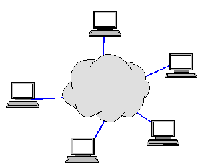cloud computing

A style of computing in which dynamic, scalable and virtual resources are provided over the Internet. Cloud computing refers to services that provide common business applications online, which are accessed from a Web browser, while the software and data are stored on the servers. For instance, Webmail applications like Hotmail and Amazon's AWS storage service (which numerous other Web applications rely on to hold their data) are examples of cloud computing.
Cloud computing specifically refers to incorporating software as a service (SaaS), platform as a service (PaaS), and infrastructure as a service (IaaS). Users do not need to have knowledge of, expertise in, or control over the technology infrastructure in the "cloud" that supports them. Cloud computing supports remote web hosting as well.
Most people who partake in cloud computing will experience an outage at some point, causing them to reconsider it as an option over "ground computing." Ground computing refers to traditional, desktop-based programs comprised of closed, proprietary files. The argument goes like this: Why risk the odds of Gmail or Google Calendar going down when you can install a dependable local application like Microsoft's Outlook? There are pros and cons with each method but it should be noted that some technology, such as audio and video files locked with "digital rights management" usage controls, combines the worst aspects of both ground- and cloud-based software because if the servers that control the DRM system go offline, you can lose access to those files through no fault of your own, while the proprietary nature of the DRM file format stops you from playing these songs and videos in competing applications.
The term originally came from the expression "in the cloud," which is a metaphor for the Internet based on how the Internet is depicted in computer network diagrams.


Edit Word